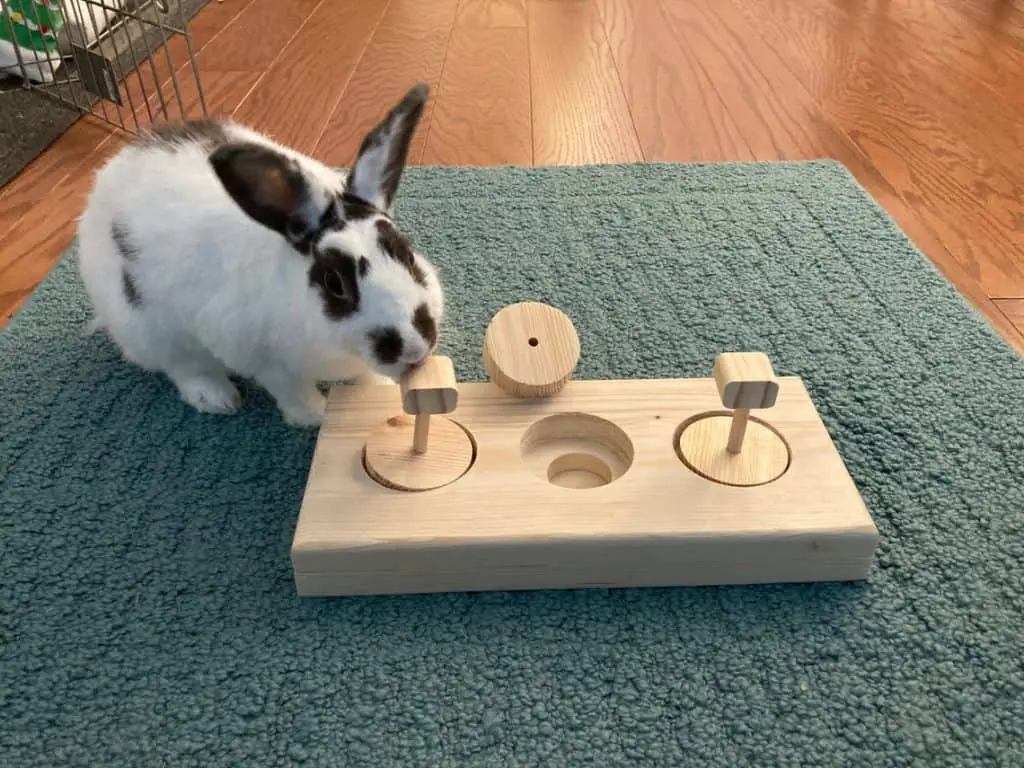Disclosure: We may earn money or products from the companies mentioned in this post.
My family has had pet rabbits for years, and people are often amazed by the intelligence of pet bunnies. But just how smart are rabbits?
Rabbits are highly intelligent. As natural prey animals, bunnies pack a lot of information in their heads because they need that information to survive in a world full of their predators. In addition, a pet rabbit’s social nature combined with their intelligence makes them easy to train.
Bunny rabbits can be taught to do numerous tasks and are capable of using logic to solve problems (e.g. puzzle toys for pets). Rabbits have even made it to the list of World Record Holders because of their amazing and entertaining capabilities.
In this article, we will be unpacking some of the most common questions about the brainpower of these hopping fluffballs of love.
Can Rabbits Be Trained?
Pet rabbits can easily be trained to exhibit countless behaviors when promoted by words, noises, or even the appearance of objects or specific movements. Individual bunnies have learned dozens of tricks and there is even a category in the Guinness Book Of World Records.
People underestimate the mental capacity of rabbits because of their docile nature.
After all, these thumpers do not always show the same need and enthusiasm to please their owners that dogs demonstrate. They also do not have that mischievous, cunning, object-swiping-even-if-they-tell-you-no attitude that most cats possess. Instead, what people see is a fluff ball quite content with nose twitching, hopping, and chewing on their favorite toys.
But don’t be fooled, just because rabbits don’t have the same energy as the dachshund next door doesn’t mean they only have air inside their heads. Just like any pet, rabbits can learn to respond to words through training. The way cats and dogs learn their names is not at all different from the way your bunny learns their name.

How To Train A Bunny
The most effective way to train a rabbit is to use positive reinforcement and repetition to encourage and reward the desired behavior. Start with small behaviors and build on that by stringing on additional small behaviors until your rabbit learns the entire behavior.
Repetition and positive reinforcement are scientifically proven to be effective training methods to teach animals to respond to certain words or commands.[1]
Positive reinforcement is defined as the training method that rewards an animal every time the animal performs the desired behavior. This desired behavior includes doing different actions when a “command word” is uttered. This can include hopping when the word “hop” is said or approaching their owners when their names are called.
Positive reinforcement rabbit training is the preferred way of teaching as it is more humane and significantly decreases the animals’ discomfort during training (negative reinforcement in comparison, the animal is forced into obeying by applying stimuli that the animal dislikes and only removing it when the animal complies) [1].
Positive reinforcement also makes use of high-value rewards. Usually, these rewards are your pets’ favorite things. These things can be their favorite treats or their favorite toys. Since this training method makes sure that the animal gets pleasant things from the training, they are most likely to respond to the command and to their names, every time they hear the sound.
Positive Reinforcement Rabbit Training Steps
1. Make sure that your rabbit is calm.
Never train your rabbit when they are agitated or nervous. This will defeat the purpose of positive reinforcement. An agitated rabbit will not enjoy the training session and will grow averse to it
2. Hold your rabbit’s reward some distance from your rabbit.
This could be their favorite snack or their favorite toy. Try shaking the box of snacks to get your rabbit’s attention.
3. When the rabbit sees you holding their snack or toy, they would start hopping towards you to reach them.
Once the rabbit comes to you, give them the reward stating their name as you do so.
Some trainers also use a clicker. A clicker is a device used during training that makes a clicking sound the exact moment the animal performs the desired behavior. In time, the animal will associate the clicking sound with the behavior needed and being rewarded. Once the rabbit gets used to this the owner can now make use of a command, in this case, the animals’ name to tell the rabbit to come.
Training should be done in short increments of time. Training can be tiring for your rabbit so keep the sessions short. A five to ten-minute session done daily should be enough for your pet to recognize their name.
Remember that consistency and patience are key, depending on your pet’s temperament some rabbits may learn quicker than others.
Can Rabbits Learn Their Name?
Rabbits can easily learn their name by rewarding them when they respond to their name. Start by sitting near your rabbit and occasionally saying its name. When they respond to the sound of their name, reward them with a treat that your bunny loves.

Can Rabbits Learn to Use A Litter Box?
Rabbits can easily be trained to use a litter box. Rabbits are naturally clean animals, and as such they are driven to use one corner of their living space as their bathroom, leaving the remaining living space clean. The trick to litter box training is to just agree with your bunny where the bathroom is located.
Rabbit poop doesn’t necessarily smell but there can be a lot of it. On average a rabbit can poop 100 pellets a day. In a week, they can produce 500 to 800 pellets of poop.
They also urinate 5 to 8 times a day. Rabbit urine contains large amounts of ammonia and is the culprit to stinky cages. Regular cleaning of hutches and cages is a responsibility of having pet bunnies. Teaching rabbits to use a litter box makes this task easier and more pleasing to rabbit lovers.
House training or Litter training needs patience and consistency. On average, a week of consistent training is enough for a pet bunny to learn how to use its litter box. However, this is not a hard rule.
The success of training is dependent upon a rabbit’s temperament.
Some rabbits are more obedient than others. If you find that your pet rabbit has a hard time following this does not mean that your rabbit is stupid, you might just have the luck of owning a stubborn pet. Don’t lose hope; training can take time but the reward at the end is worth it.
To make sure that litter box training is successful it is important to provide the proper litter box for your pet.
Make sure that the cage of your rabbit has space to hold a litter box but is still comfortable enough for your pet bunny to sleep in. A rule of thumb is for a cage to be four times the size of your pet rabbit.
Layer your rabbit’s litter box with hay, this will make it more appealing for your pet. Rabbits can chew on this while they are going to the bathroom.
It is good to know that neutered or spayed rabbits decrease activities that are hormonally driven such as marking which is when both male and female rabbits spray urine to mark their territory. By spaying or neutering your rabbit, you will increase the likelihood that your pet bunny will use its litter box and not your favorite spot on the couch.
House training rabbits usually means decreasing freedom at first. Do not let your rabbit have free reign of your house during little box training.
Keep it in its cage (but provide time for exercise) until it can reliably use the litter box. Position the litter box in the corner of the cage where the rabbit usually goes to the bathroom.
Once your pet bunny is used to the idea of a litter box you can give them more freedom. Make sure to provide litter boxes that are not in the cage so they can have a place to go to whenever they are not inside.
Can Rabbits Learn Tricks
Rabbits can learn tricks just like many other pets because they are highly intelligent and social. Patience, time, and consistency ensure the success of any training. Rabbits have the capability of associating words or commands to certain behaviors.
Remember that size and temperament is not necessarily indicative of brainpower.
Just like any other pet, each rabbit is unique thus, the time that they take to learn tricks can differ. Stubborn rabbits will take a longer time than more obedient-natured rabbits. However, nothing is impossible. Besides, teaching rabbits (or any pet for that matter) is a challenging task that not only benefits the pet but also the owner; each is better after the task is finished.
Some of the commands that rabbits can learn are kennel, jump/hop, spin, come, sit, and countless others.
Did you know that there are also rabbits who are titleholders for being able to do tricks better than any other? Taawi the Turku, from Finland, is the titleholder for “World’s Multi-Talented Rabbit”. He can do 20 tricks in just one minute! Now that’s a star! He can do the usual pet tricks but can also do unique ones such as giving a high-five, nibbling through a string, and selecting a card out of his owner’s hands.

Are Rabbits Smarter Than Dogs?
Rabbits are as smart as dogs, however, they are not as driven to please as most dogs. This means that while your faithful fido will normally strive to do anything just for a pat on the head, your rabbit might be a little more reward-driven and might need the treat to perform on command.
When it comes to comparing the intelligence of rabbits and dogs, we have to remember that how smart they seem might depend if the desired behavior is more bunny-like or more dog-like.
It is hard and unfair to compare the intelligence of two animals from different species if we are asking them to do things that go against their species behavior. For example, you’re not going to get a rabbit which is a prey animal to ‘attack’ on command.
If the question is whether rabbits can be trained as well as dogs, then the answer is an absolute yes but, this is also dependent on what activity is expected from a rabbit. After all, we can’t expect a dolphin to be trained to climb a tree, so we can’t expect to train a rabbit to bark. Just the same, we must expect that dogs can’t be smarter or more adept in rabbit-like activities such as hopping
However, rabbits and dogs can be trained to do the same activities such as approaching the owner on command, staying in place when told to, using a designated place to use as a bathroom, etc.
Aside from the fact that dogs are different from rabbits biologically, training is highly dependent on the pet. Each pet is not like any other, some are more pliable than others while some enjoy showing their owners who’s the boss.
One thing is for sure though, whether a pet is stubborn or obedient, training creates a happy and well-adjusted pet. It is also a sure-fire way to create that coveted human and animal companion bond.

Are Rabbits Smarter Than Cats?
Rabbits are just as smart as cats. They can learn anything a cat can learn, and they can even learn more because they are more driven to please than most cats. In addition, bunnies are just as clever as cats in escaping places they don’t want to be or get to things that they really want.
While their intelligence level is similar, cats and rabbits are very different animals. Cats take on the role of predator in the food chain while rabbits are considered prey. From this biological and ecological standpoint, cat and rabbit intelligence vary because they both play different roles in the wild.
One can argue that cats should be smarter than rabbits because as predators, they should have retained the competitiveness of their ancestors. Predators are survivalists, always expected to adapt and learn quickly lest they be bested by other predators. Failure to do so could be fatal.
However, you can also use this same argument for prey animals like rabbits. Preys need to be quick on their feet and they also have to be smart enough to outwit their predators. Failure to do so could mean they will end up as dinner on someone else’s table.
In all honesty, arguing which is more intelligent is pointless because the fact is, no one can say for sure. Cats will be more intelligent when it comes to things that are natural to them. Like, say, jumping to elevated spaces and always landing on four feet. They are also immensely good at swiping things off counters.
Cats, however, will find it hard to learn how to hop. Rabbits will also be more adept at doing things that are intrinsic to their species. It would be impossible for an owner to teach their rabbit to meow.
Some pet owners claim that rabbits and cats are similar in that both tend to be more standoffish and independent than dogs. They also do not like to be smothered with attention. However, given time and proper care cats and rabbits both learn to trust and be ready to cuddle up to their owners.
Rabbit owners should celebrate what makes their pet unique and avoid the trap of comparison. Each pet has its quirks and personalities just like its owners. What makes them special is what sets them apart from all other pets. What remains constant between them though is their capacity for unconditional love.
Are Rabbits Smarter Than Rats And Mice?
Rats and mice are considered to be smarter than rabbits and because of that, they are often used in laboratory settings to study the behavior of intelligent animals and even humans. While rabbits are intelligent and can be trained to do most tasks, a rat with similar training will learn faster.
Rats have the benefit of being studied by neuroscientists to see how their brain works. Therefore, in terms of scientific data of intelligence, rats, and mice have science on their side. Just like rats, rabbits can also learn the same concepts such as getting rewarded for doing a certain behavior or learning how to escape their cage.
Personality can also be a factor in this debate. Rats are generally more curious than rabbits, the majority of which have a laid-back nature. Of course, this isn’t true for all bunnies or rats.
Just because this trait is observed in the majority of mice and rabbits it does not mean that a pet rabbit will not possess the same curiosity that rats exhibit. The same with rats, some rats can also be very laid back.
The trainer is also a huge factor, a owner who is bonded with their pet will be able to teach more tricks as a relationship of trust is established between them.
It isn’t intelligence that is the main factor that determines whether a rat or a rabbit is more suitable as a pet. There are pros and cons to owning each animal. Some people prefer rabbits because they are more docile while others are caught up in rodent fever and prefer having rats/mice as pets.
Are Rabbits Smarter Than Guinea Pigs?
Rabbits are generally believed to be smarter than guinea pigs. Rabbits have more neurons in their brains compared to Guinea Pigs. Since they have more neurons, they have more brainpower for learning.
However, guinea pigs can also hold their own. Guinea pigs are better at remembering things because rabbits have short-term memories. Guinea pigs can even remember their way back home. Rabbits on the other hand can be taught more complex tricks than guinea pigs.
This does not mean that guinea pigs can’t learn. There are anecdotes of pet guinea pigs learning the same tricks as other pets. However, training them to use the litter box can be quite a chore.
Whether a person decides to own a rabbit or a guinea pig is entirely a personal choice with no right or wrong answer.
There are advantages and disadvantages to owning each type of pet.
A rabbit may be too high maintenance for others while a guinea pig might prove to be not a good fit for other people’s lifestyles.
Rarely does intelligence come into play when it comes to choosing a pet. Pets provide us with companionship and love and whether it takes them some time to learn their names or get the litter box training right, these are all small steps taken to form a bond with them.
Are Rabbits Smarter Than Chickens?
There is no definitive study to say whether rabbits are smarter than chickens. However, rabbits and chickens are two of the underestimated animals in terms of intelligence. A recent study claims that chickens are smarter than they seem.
Animal Cognition, a peer-reviewed scientific journal, has recently claimed that chickens are intelligent creatures as they can demonstrate self-control and even self-awareness.
Cats are no longer alone in the category of cunning house pets, chickens are also revealed to be cunning as well. This study shows that chickens have complex intellectual and emotional lives. Chickens are also found out to have some powers of logic as they can make logical inferences and deductions.
Chicken owners have been rightfully validated for what they have known for so long, that chickens might just be the smartest animal in the barnyard.
Are Rabbits Smarter Than Squirrels?
While rabbits are smart, there is no definitive proof that they are smarter than squirrels. No journal or directory exists that effectively measures the intelligence of squirrels vs rabbits. However, by watching squirrels try to get to food, I personally suspect the squirrels are smarter than rabbits.
Squirrels and rabbits are highly trainable. Squirrels are more curious than rabbits and are known to be crafty litter critters. They are also known to be obsessive hoarders and would do anything to get what they want. This makes them easy to train as they would do anything for a treat.
Squirrels also have more agility than rabbits. They make crossing the road an adventure as they try to swerve and dodge traffic. Keeping squirrels as a pet can be more troublesome because of this behavior. They are faster than the docile rabbit and they always have to hunt for their food.
Either way, training squirrels will be an entertaining, challenging but equally rewarding endeavor.
Are Rabbits Smarter Than Humans?
Humans are smarter than rabbits because humans have a more powerful brain than bunnies. Honestly, it’s not even close. Rabbits are unquestionably cuter than humans and are questionably sweeter, but they are not more intelligent.
We often mistake an animal’s overall disposition and temperament as indicative of its IQ. Animals that do not appear very curious or exhibit a standoffish nature are often believed to be dumb compared to animals who exhibit traits of curiosity and high energy. This assumption has been disproven by many studies.
Rabbits are now known to be a whole lot smarter than they seem, they can be taught dozens of tricks and are known to be capable of problem-solving. If you want to see some of the puzzles designed to challenge your rabbit, check out my collection of the best rabbit puzzles on Etsy.

Until the rabbits of the world come together to create a huge rabbit revolution to overthrow the dominion of humans we will never fully understand just how much smarter we are than our pets at home. But, the point of having a pet isn’t that of control.
We are long past the belief that our capacity to think and understand more complex concepts means that we can have dominion over other animals. The saying with great (brain) power comes great responsibility is true.
Our brains are bigger and capable of more understanding and therefore, it is our responsibility to ensure that animals are well protected. It is in our hands to provide a world that these animals can live in comfortably, be it by living a sustainable lifestyle or being an informed pet owner.
In return, our pets provide the best of companionships that ask for nothing back but always give, unconditionally.
~Stacey
___
We hope that you have enjoyed this article. Do you own any of the two species compared above? Based on your experience, which one is smarter? Is your experience the same as what is widely believed or is it different? Tell us your story!
Sources:
1Veeder CL, Bloomsmith MA, McMillan JL, Perlman JE, Martin AL. Positive reinforcement training to enhance the voluntary movement of group-housed sooty mangabeys (Cercocebus atys atys). J Am Assoc Lab Anim Sci. 2009;48(2):192-195.
